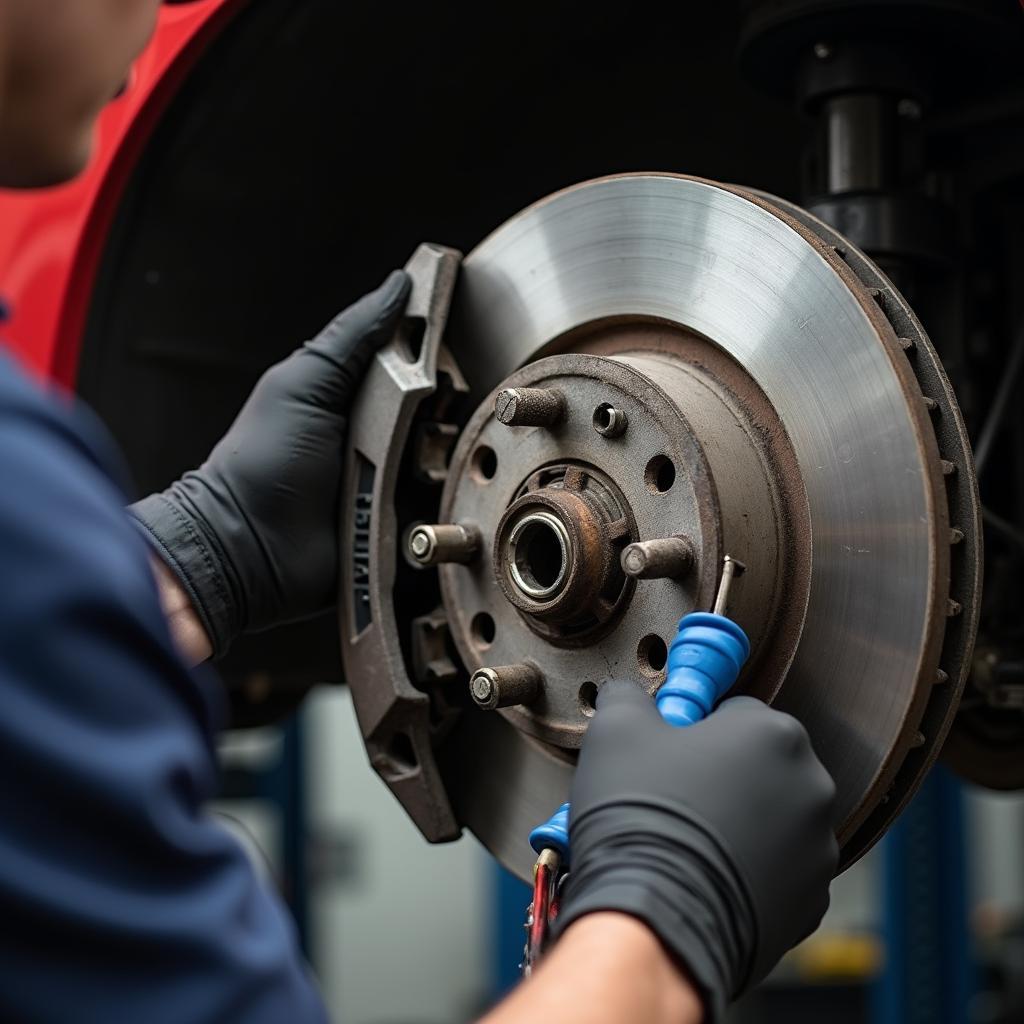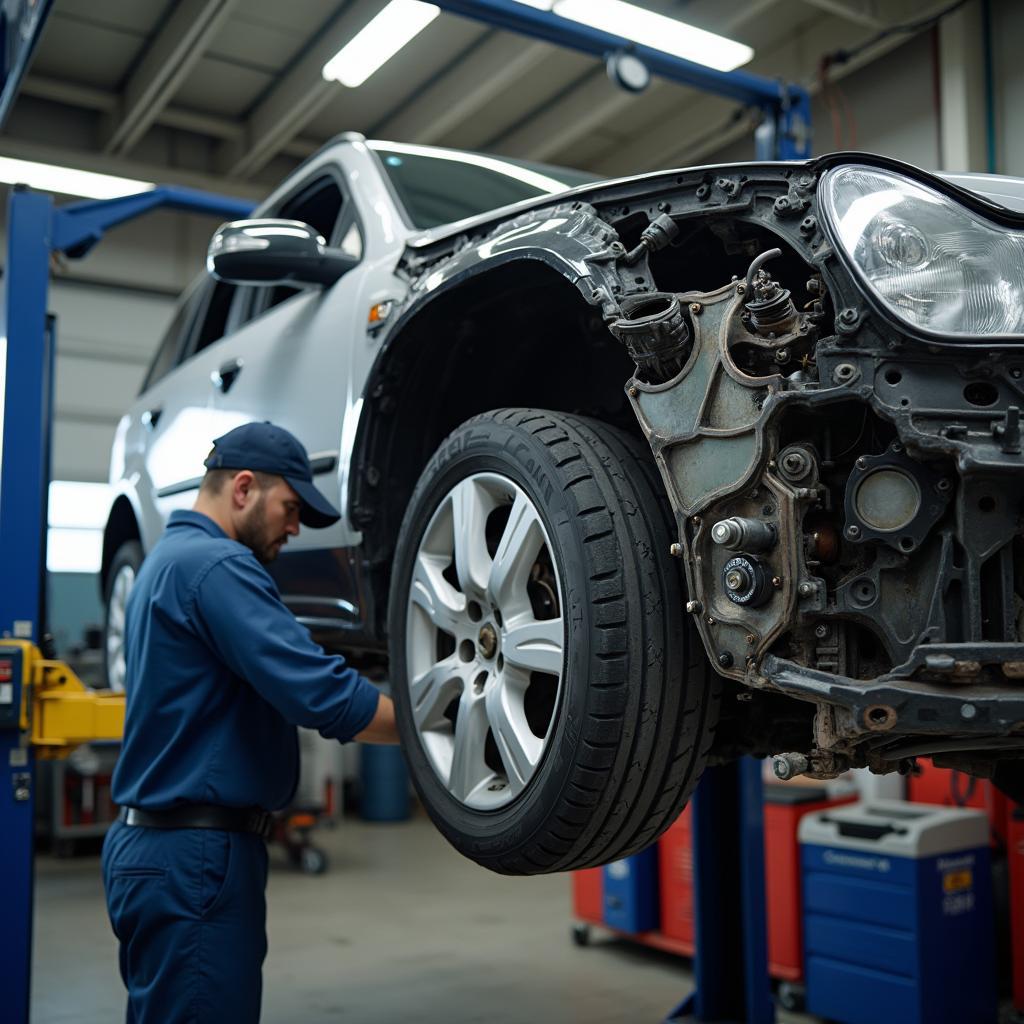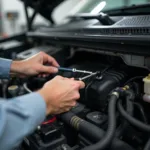Choosing the right Auto Mobile Services is crucial for maintaining your vehicle’s performance, safety, and longevity. Whether you’re looking for routine maintenance or complex repairs, understanding the range of services available and finding a trustworthy provider is essential. This comprehensive guide will explore the ins and outs of auto mobile services, equipping you with the knowledge to make informed decisions for your car.
Understanding Your Car’s Needs
Just like us, cars thrive on regular check-ups and timely attention to their needs. Recognizing the early signs of trouble can save you from costly repairs down the line. Here are some key indicators that your car might be due for a visit to the mechanic:
- Unusual noises: Squealing brakes, knocking sounds from the engine, or clunking noises from the suspension.
- Warning lights on the dashboard: Check engine light, oil pressure light, or battery light.
- Fluid leaks: Oil, coolant, brake fluid, or transmission fluid.
- Performance issues: Reduced fuel efficiency, difficulty starting, or sluggish acceleration.
Types of Auto Mobile Services
Auto mobile services encompass a wide spectrum of maintenance, repair, and diagnostic procedures. Here are some of the most common services you’ll encounter:
1. Routine Maintenance
Regular maintenance is the cornerstone of car care, ensuring optimal performance and preventing premature wear and tear. Key routine services include:
- Oil Change: Regular oil changes lubricate engine components, reducing friction and heat.
- Filter Replacements: Air filters, oil filters, and cabin filters keep your engine clean and your air quality fresh.
- Tire Services: Tire rotations, balancing, and alignments ensure even wear and improve handling.
- Brake Inspections: Checking brake pads, rotors, and fluid levels ensures safe stopping distances.
 Brake Inspection
Brake Inspection
2. Engine Repair
Engine problems can be complex and costly. Common engine repairs include:
- Spark Plug Replacement: Worn spark plugs can cause misfires and reduce engine performance.
- Timing Belt/Chain Replacement: A broken timing belt or chain can lead to catastrophic engine damage.
- Head Gasket Repair: A blown head gasket can allow coolant to leak into the engine oil, leading to overheating and engine failure.
3. Transmission Services
The transmission system transfers power from the engine to the wheels. Transmission services include:
- Fluid Flush: Replacing old transmission fluid ensures smooth shifting and prevents damage to internal components.
- Filter Change: Transmission filters remove contaminants from the fluid, extending the life of the transmission.
- Repairs: Transmission repairs can involve replacing seals, clutches, or even rebuilding the entire unit.
 Transmission Repair
Transmission Repair
4. Electrical System Services
Modern cars rely heavily on complex electrical systems. Common electrical services include:
- Battery Testing and Replacement: A weak or dead battery can leave you stranded.
- Alternator Repair: The alternator charges the battery and powers electrical components.
- Starter Repair: The starter motor initiates the engine’s combustion cycle.
5. Heating and Cooling System Services
Maintaining a comfortable cabin temperature is essential for driver and passenger comfort. Common HVAC services include:
- Refrigerant Recharge: AC refrigerant can leak over time, reducing cooling efficiency.
- Heater Core Repair: The heater core circulates hot coolant to provide warmth in the cabin.
- Blower Motor Replacement: The blower motor forces air through the vents.
6. Auto Detailing Services
Auto detailing services go beyond basic car washes to enhance your vehicle’s appearance and protect its paint. Services include:
- Exterior Wash and Wax: Removes dirt, grime, and protects the paint with a layer of wax.
- Interior Cleaning: Vacuuming, shampooing carpets and upholstery, and cleaning interior surfaces.
- Paint Correction: Removes scratches, swirls, and imperfections to restore the paint’s shine.
 Auto Detailing
Auto Detailing
Choosing the Right Auto Service Provider
Selecting a reputable and trustworthy auto service provider is crucial for peace of mind and quality repairs. Here are some factors to consider:
- Reputation: Look for shops with positive online reviews and recommendations from friends and family.
- Experience: Choose a shop with experienced technicians who specialize in your car’s make and model.
- Certifications: ASE (Automotive Service Excellence) certification is a recognized industry standard for technicians.
- Warranty: Inquire about warranties on parts and labor.
- Communication: Choose a shop that communicates clearly and provides detailed explanations of repairs.
Tips for Saving Money on Auto Mobile Services
Car repairs can put a dent in your budget, but proactive maintenance and smart choices can help you save money:
- Follow Your Car’s Maintenance Schedule: Adhering to the manufacturer’s recommended maintenance schedule can prevent costly repairs down the line.
- Shop Around for the Best Prices: Compare quotes from multiple shops before committing to a repair.
- Ask About Discounts: Many shops offer discounts for seniors, students, or military personnel.
- Consider DIY Repairs: Simple maintenance tasks like oil changes or air filter replacements can be done at home with basic tools.
Frequently Asked Questions About Auto Mobile Services
1. How often should I get an oil change?
Most manufacturers recommend an oil change every 3,000 miles or 3 months, whichever comes first. However, consult your owner’s manual for specific recommendations for your vehicle.
2. What does the check engine light mean?
The check engine light can indicate a wide range of issues, from a loose gas cap to a serious engine problem. It’s best to get your car diagnosed by a mechanic as soon as possible.
3. How long can I drive with my brakes making noise?
Ignoring brake noises can be dangerous. If you hear squealing, grinding, or scraping sounds, get your brakes inspected immediately.
4. How do I know if my timing belt needs to be replaced?
Consult your owner’s manual for the recommended timing belt replacement interval. If you’re unsure, have it inspected by a mechanic.
5. How often should I rotate my tires?
Tire rotations are typically recommended every 5,000-8,000 miles. However, check your owner’s manual for specific recommendations.
Conclusion
Proper auto mobile services are essential for keeping your car running smoothly and safely. By understanding your car’s needs, the range of services available, and how to choose a trustworthy provider, you can make informed decisions that protect your investment and keep you on the road for years to come.


